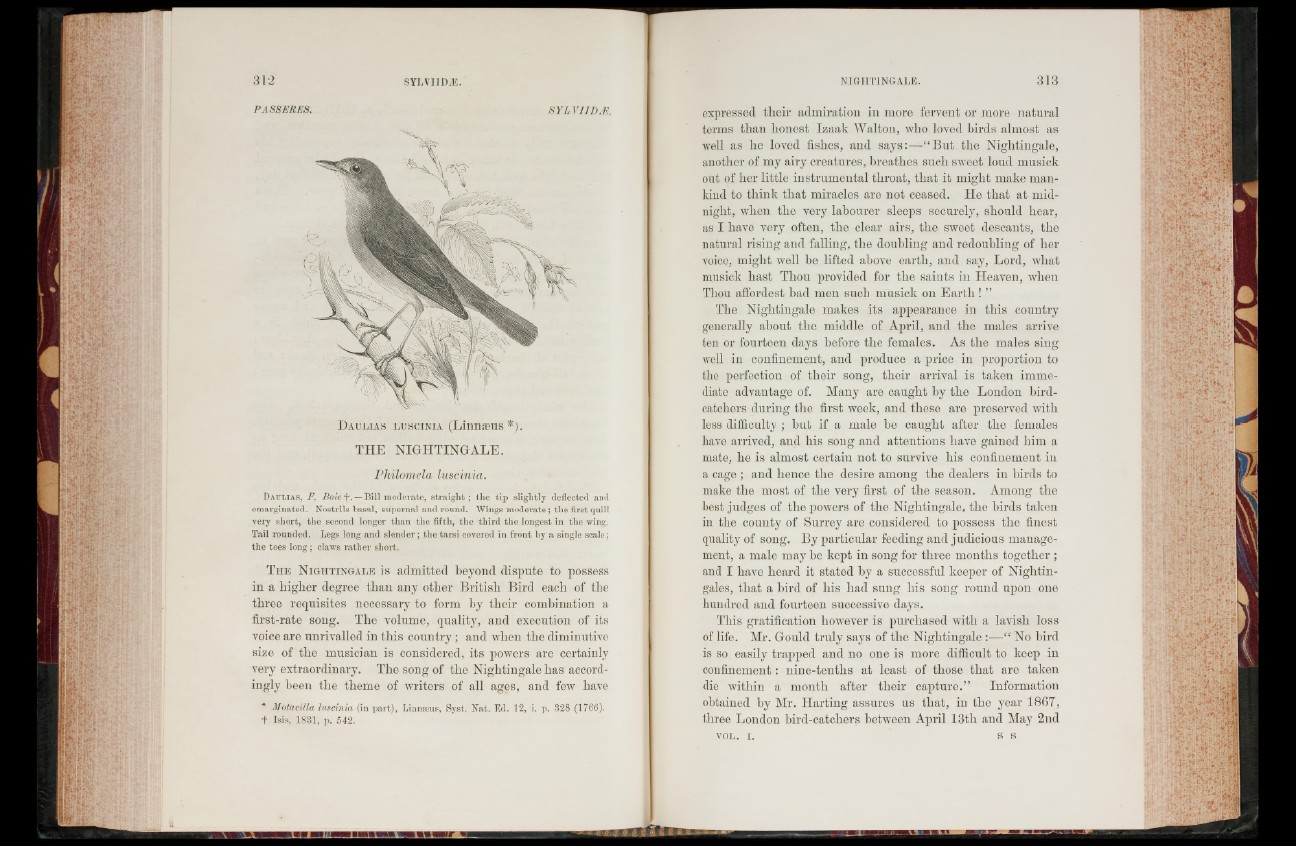
m k f: ? » ,
M # :■ I# * # -
Pit‘ ■'
P A S S £ RES. S Y L VJIDJi.
D a h l i a s l u s c i n i a (L in n a e u s * ) .
THE NIGHTINGALE.
Philomela luscinia.
Da u l ia s , F. Boie — Bill moderate, straight; the tip slightly deflected and
emarginated. Nostrils basal, supernal and round. Wings moderate; the first quill
very short, the second longer than the fifth, the third the longest in the wing.
Tail rounded. Legs long and slender; the tarsi covered in front by a single scale;
the toes long; claws rather short.
T h e N ig h t in g a l e is admitted beyond dispute to possess
in a higher degree than any other British Bird each of the
three requisites necessary to form by their combination a
first-rate song. The volume, quality, and execution of its
voice are unrivalled in this country; and when the diminutive
size of the musician is considered, its powers are certainly
very extraordinary. The song of the Nightingale has accordingly
been the theme of writers of all ages, and few have
* Motacilla luscinia (in part), Linnasus, Syst. Nat. Ed. 12, i. p. 328 (1766).
t Isis, 1831, p. 542.
expressed their admiration in more fervent or more natural
terms than honest Izaak Walton, who loved birds almost as
well as he loved fishes, and says:—“ But the Nightingale,
another of my airy creatures, breathes such sweet loud musick
out of her little instrumental throat, that it might make mankind
to think that miracles are not ceased. He that at midnight,
when the very labourer sleeps securely, should hear,
as I have very often, the clear airs, the sweet descants, the
natural rising and falling, the doubling and redoubling of her
voice, might well be lifted above earth, and say, Lord, what
musick hast Thou provided for the saints in Heaven, when
Thou affordest bad men such musick on E a r th ! ”
The Nightingale makes its appearance in this country
generally about the middle of April, and the males arrive
ten or fourteen days before the females. As the males sing-
well in confinement, and produce a price in proportion to
the perfection of their song, their arrival is taken immediate
advantage of. Many are caught by the London bird-
catchers during the first week, and these are preserved with
less difficulty ; but if a male be caught after the females
have arrived, and his song and attentions have gained him a
mate, he is almost certain not to survive his confinement in
a cage ; and hence the desire among the dealers in birds to
make the most of the very first of the season. Among the
best judges of the powers of the Nightingale, the birds taken
in the county of Surrey are considered to possess the finest
quality of song. By particular feeding and judicious management,
a male may be kept in song for three months together ;
and I have heard it stated by a successful keeper of Nightingales,
that a bird of his had sung his song round upon one
hundred and fourteen successive days.
This gratification however is purchased with a lavish loss
of life. Mr. Gould truly says of the Nightingale :— “ No bird
is so easily trapped and no one is more difficult to keep in
confinement: nine-tenths at least of those that are taken
die within a month after their capture.” Information
obtained by Mr. Harting assures us that, in the year 1867,
three London bird-catchers between April 13tli and May 2nd
v o l . i . s s